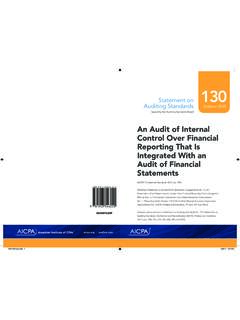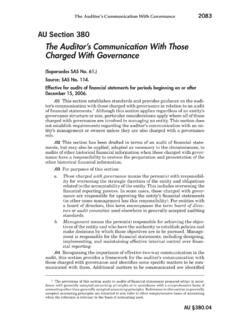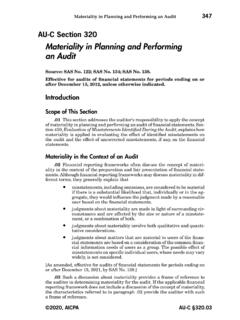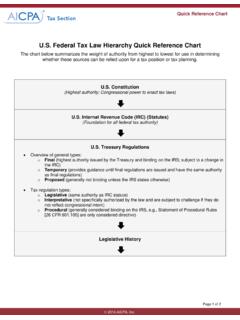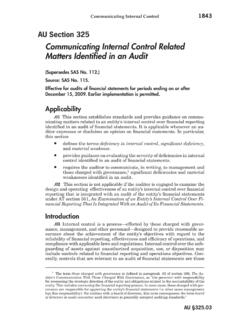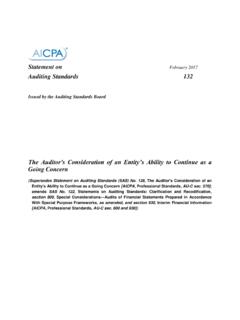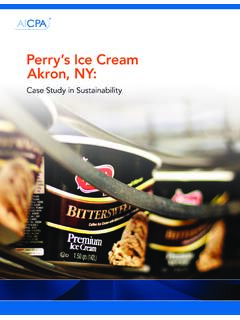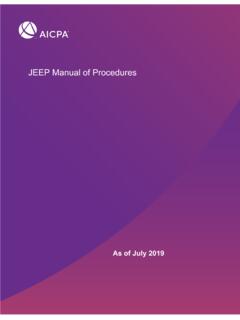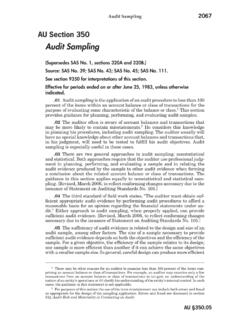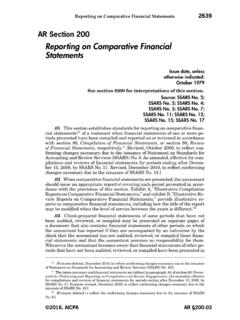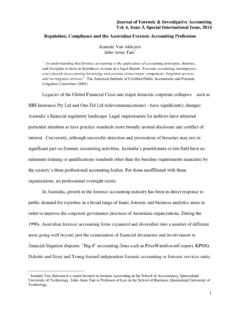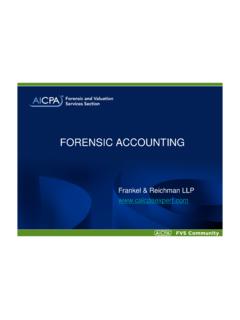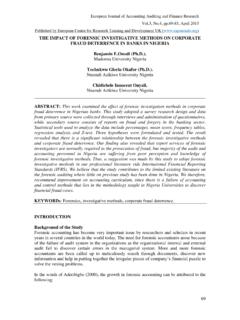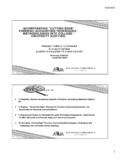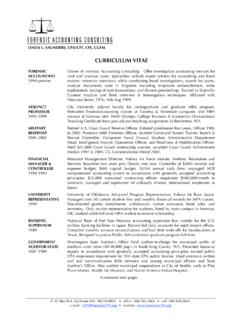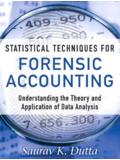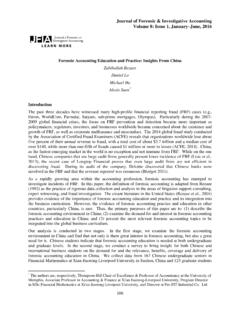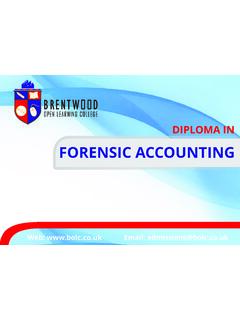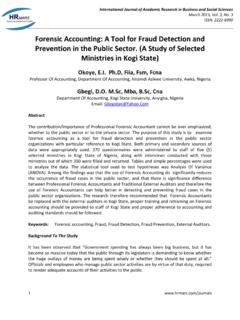Transcription of Forensic Accounting – Fraud Investigations - AICPA
1 Forensic Accounting Fraud InvestigationsPage 1 2014, AICPA Forensic & Valuation Services Practice Aid Forensic Accounting Fraud Investigations Page 2 2014, AICPA Copyright 2014 by American Institute of Certified Public Accountants, Inc. New York, NY 10036-8775 All rights reserved. For information about the procedure for requesting permission to make copies of any part of this work, please e-mail with your request. Otherwise, requests should be written and mailed to the Permissions Department, AICPA , 220 Leigh Farm Road, Durham, NC 27707-8110. Page 3 2014, AICPA Notice to Readers This publication provides illustrative information for the subject matter covered.
2 It does not establish standards or preferred practices. The material was prepared by the AICPA staff and volunteers and has not been considered or acted upon by AICPA senior technical committees or the AICPA board of direc-tors and does not represent an official opinion or position of the AICPA . It is provided with the under-standing that the AICPA staff and the publisher are not engaged in rendering any legal, Accounting , or other professional service. If legal advice or other expert assistance is required, the services of a compe-tent professional person should be sought. The AICPA staff and this publisher make no representations, warranties, or guarantees about, and assume no responsibility for, the content or application of the mate-rial contained herein and expressly disclaim all liability for any damages arising out of the use of, refer-ence to, or reliance on such material. This publication supersedes Practice Aid 07-1, Forensic Accounting Fraud Investigations .
3 Acknowledgements The principal authors of this practice aid are members of the 2012 2014 Forensic and Litigation Ser-vices Fraud Task Force. Annette Stalker, Chair Hubert Klein Jason Flemmons Jim O Brien Tyler Geiman Kristin Rivera Christopher Hunt Howard Silverstone David Zweighaft We would like to note a special thank you to Tim Bryan who contributed to the computer Forensic con-tent as well as FTI Consulting for their help in editing this publication. In addition, members of the 2012 2014 Forensic and Litigation Services Committee and Forensic and Valuation Services Executive Committee also provided information and advice to the author and AICPA staff for the update to this practice aid. AICPA Staff Jeannette Koger Vice President Member Specialization & Credentialing Eddy Parker Associate Director FVS Section Barbara Andrews Manager FVS Section Page 4 2014, AICPA Recent Development Significant to This Practice Aid: AICPA s Ethics Codification Pro-ject The AICPA s Professional Ethics Executive Committee (PEEC) restructured and codified the AICPA Code of Professional Conduct (code) so that members and other users of the code can apply the rules and reach correct conclusions more easily and intuitively.
4 This is referred to as the "Ethics Codification Project." Although PEEC believes it was able to maintain the substance of the existing AICPA ethics standards through this process and limited substantive changes to certain specific areas that were is need of revi-sion, the numeric citations and titles of interpretations have all changed. In addition, the ethics rulings are no longer in a question and answer format but rather, have been drafted as interpretations, incorpo-rated into interpretations as examples, or deleted where deemed appropriate. Some examples are as fol-lows: The "Independence Rule," Independence ( AICPA , Professional Standards, ET sec. 101 par..01), will be referred to as the Independence Rule" [ET sec. ] in the revised code. The content from the ethics ruling titled "Financial Services Company Client has Custody of a Member s Assets" ( AICPA , Professional Standards, ET sec. 191 par..081 .082), was incorpo-rated into the "Brokerage and Other Accounts" interpretations [ET sec.]
5 ] found under the subtopic "Depository, Brokerage, and Other Accounts" [ET sec. ] of the "independ-ence" topic [ET sec. ]. The revised code is effective December 15, 2014, and is available at The pre-revision code is available at Citations to the code in this manuscript are provided in footnotes for both the revised and the pre-revision code. The PEEC has created a mapping document that can provide additional assistance in locating pre-revision content in the revised code. The mapping document is available in Excel format at and can also be found in appendix D in the revised code. Page 5 2014, AICPA Table of Contents Chapter 1 Introduction .. 8 Scope of This Practice Aid .. 8 Professional Standards and Non-authoritative Guidance .. 9 Limitations of This Practice Aid .. 9 Prevalence of Fraud .. 10 Litigation Environment.
6 10 Building a Team With Diverse Specializations .. 11 Client-Practitioner Relationship .. 11 Legal Bases for Fraud Allegations and Related Services .. 12 Chapter 2 Definitions .. 14 14 Forensic .. 15 Litigation .. 15 Chapter 3 Types of Engagements .. 16 Fraud Prevention and Detection .. 17 Fraud 17 Fraud Detection .. 17 Asset Misappropriation .. 18 Financial Statement Misrepresentation .. 18 Corruption and Other Illegal Acts .. 19 Economic Damages Calculations .. 19 Bankruptcy, Insolvency, and Reorganization .. 20 Family Law .. 20 Digital Forensic Analysis .. 21 E-Discovery .. 21 Forensic Data Analysis .. 22 Chapter 4 Engagement Scope and Acceptance Considerations .. 24 Scope of Service .. 24 Conflicts of Interest .. 25 Engagement Acceptance Issues, Including Payment of Fees .. 26 Oral or Written Understandings .. 26 Page 6 2014, AICPA Staffing Engagements.
7 27 Chapter 5 Engagement Performance .. 28 Public Document Review and Background investigation .. 29 Interviews of Knowledgeable Persons .. 29 Planning the Interview .. 30 The Interview Setting .. 30 During the Interview .. 30 Concluding the Interview .. 31 Meeting 31 Confidential Sources .. 31 Laboratory Analysis of Physical and Electronic Evidence .. 32 Physical Surveillance and Observation .. 33 Undercover Operations .. 33 Analysis of Financial Transactions .. 33 Internal Financial Records .. 34 External Financial Records .. 34 Chapter 6 Engagement Reporting and Deliverables .. 35 Disclosing Findings of Potential Fraud .. 35 Written Communications .. 35 Oral Communications .. 36 Chapter 7 Deposition and Trial Testimony .. 38 Qualifications .. 39 Deposition Testimony .. 39 Trial Testimony .. 40 General Tips for Testimony .. 40 Chapter 8 Professional Standards, Regulatory Issues, and Other Leading Practices .. 41 CS Section 100 .. 41 Engagement Letters.
8 41 Due Care .. 41 Competence .. 42 File Documentation .. 42 Chapter 9 Using the Work of a Specialist .. 43 Decision to Use the Work of a Specialist .. 43 Page 7 2014, AICPA Understanding of the Nature of the Work Performed or to be Performed by the Specialist .. 43 Appendix A Glossary of Selected Legal and Fraud -Related Terms .. 45 Appendix B Legal References Related to Selected Criminal Violations Associated With Fraud .. 50 Appendix C Illustrative Paragraphs Describing the Scope of Work for Engagement Letters .. 51 Appendix D Common Asset Misappropriation Fraud Schemes .. 54 Appendix E Non-Exhaustive List of Common Financial Statement Fraud Schemes and Related Red Flags 59 Appendix F Fraud Theories .. 67 Page 8 2014, AICPA Chapter 1 Introduction The AICPA s Forensic and Litigation Services (FLS) Fraud Task Force revisited AICPA Practice Aid 07-1, Forensic Accounting - Fraud Investigations and Special Report Forensic Procedures and Special-ists: Useful Tools and Techniques to combine these resources into a single, comprehensive practice aid.
9 Revisions were made to accommodate changes in language, scope of coverage, and advancements in the legal, technological, and regulatory environments that have occurred since the introduction of these doc-uments in 2007 and 2006, respectively. This practice aid provides you, the Forensic accountant, also referred to herein as practitioner, with a framework for understanding the scope of services, administrative considerations, and investigative techniques that are typically involved in Forensic Accounting engagements. Scope of This Practice Aid Cases involving management Fraud , money laundering, tax Fraud , bankruptcy Fraud , securities Fraud , and other types of Fraud continue to be prevalent and are increasing in frequency. Fraud issues surface in many engagement circumstances that involve the skills of the practitioner, including attest, tax, and gen-eral consulting services. This practice aid discusses your responsibilities, opportunities, and assignments only in the context of Forensic Accounting services, which comprise litigation consulting and Fraud in-vestigative services, and provides you with non-authoritative guidance for engagements in which you are providing such services.
10 This practice aid does not set standards for the performance of such en-gagements or other Forensic Accounting services. A key difference between Forensic Accounting services engagements and other consulting services en-gagements is that Forensic Accounting services involve an existing or potential dispute resolution pro-ceeding. Many CPA services that address or consider the possible occurrence or prevention of Fraud are not necessarily classified as Forensic Accounting services. These services include the following: Assessing the risk of Fraud and illegal acts Evaluating the adequacy of internal control systems Substantive testing of transactions during an attest or a general consulting engagement Designing and implementing internal control procedures Proactive monitoring and performing analysis and tests when Fraud is not suspected Preparing company codes of business ethics and conduct Developing corporate compliance programs These services are not addressed in this practice aid.
